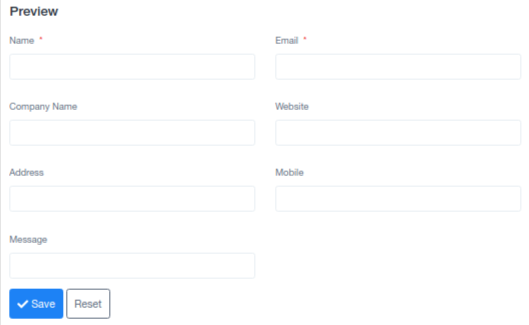Lead Forms are the visible forms that people see when they want to send their questions or requests to the organization. These forms typically ask for specific information, and the organization can decide which fields to include or exclude.

Here’s what a Lead Form might look like for someone submitting their details and the message they want to ask.
If the admin/user thinks that collecting information for a particular section is not needed, they can choose to turn off that section. This way, the person submitting the form won’t have to provide data for that specific section, and it also helps reducing the amount of information stored in the database, and further storage in the database is also reduced.

Lead forms can be used in various contexts and industries to collect information from individuals who are interested in a product, service, or organization. Here are some common places where lead forms are often utilized:
- Websites:
- Lead forms are frequently placed on company websites to capture inquiries, requests for information, or to allow users to sign up for newsletters.
- Landing Pages:
- Dedicated landing pages for specific campaigns or promotions often feature lead forms to gather contact details from potential customers.
- Social Media:
- Advertisements on platforms like Facebook, Instagram, or LinkedIn often include lead forms to capture user information directly from the ad.
- Events and Trade Shows:
- Lead forms are used at events to collect information from attendees who express interest in a company’s products or services.
- Webinars and Workshops:
- Registration forms for online events or workshops often serve as lead forms, capturing participant details for future engagement.
- E-commerce Checkout:
- During the checkout process on e-commerce websites, lead forms may be used to gather customer information for order processing and future marketing.
- Customer Feedback Forms:
- Forms designed to gather feedback or reviews can serve as lead forms by capturing customer contact information for follow-up or marketing purposes.
- Contests and Giveaways:
- Lead forms are commonly used in contests or giveaways where participants provide their information to enter the competition.
- Surveys and Market Research:
- Lead forms can be incorporated into surveys or market research studies to collect respondent information for further analysis.
- Job Applications:
- On career pages or job application portals, lead forms may be used to collect information from potential job candidates.
In essence, lead forms are versatile tools that can be implemented wherever there is a need to gather information from individuals interested in a particular offering or engagement. They are crucial for building and maintaining a connection with potential customers or participants.
Products in the Lead form : #
To make the lead form more informative we added the product field to the lead form.
Login > lead > lead form





